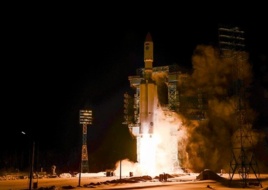A space bill being considered by Congress is directing the defense secretary to look for opportunities to collaborate in orbit with Indo-Pacific allies.
Reps. Jason Crow (D-CO) and Jeff Crank (R-CO) introduced the Quad Space Act last week. A companion bill was introduced in the Senate in June by Sens. Michael Bennet (D-CO) and Kevin Cramer (R-ND).
Context: The Quadrilateral Security Dialogue, better known as the Quad, is a partnership between Australia, India, Japan, and the US. Though the grouping—which is not a formal alliance—got off the ground in earnest in 2017, the member states have grown closer in recent years over their shared concerns about China’s behavior. Leaders of the four nations met for the first time (albeit virtually) in 2021, and have held five summits since then.
The Quad nations boast an impressive resume in orbit.
- The US has a robust commercial, civil, and national security space enterprise;.
- Australia has an impressive ground station network that’s critical for space comms;
- Japan has a thriving space industry with government-backed plans to explore the Moon and deep space;
- India became the first to land on the lunar south pole in 2023, and is now turning its sights to a sovereign human spaceflight program.
Specifics: The bill would promote broader cooperation among the Quad nations to tackle security challenges in-orbit. Specifically, a member of Crow’s staff told Payload that the bill will encourage partnerships concerning:
- Formulating best practices in space together;
- Cooperating on space situational awareness;
- Crafting space industrial policies.
The why: Though China isn’t explicitly mentioned in the bill, the legislation clearly is aimed to rally allies in orbit to stay ahead of Beijing in the second space race.
“It’s critical that America continue to lead in space. We must meet modern challenges to keep us safe, and that’s why I’ve introduced the Quad Space Act,” Crow told Payload in a statement.
“This bipartisan bill will strengthen cooperation with our allies, and advance America’s mission to win the twenty-first century space race.”





